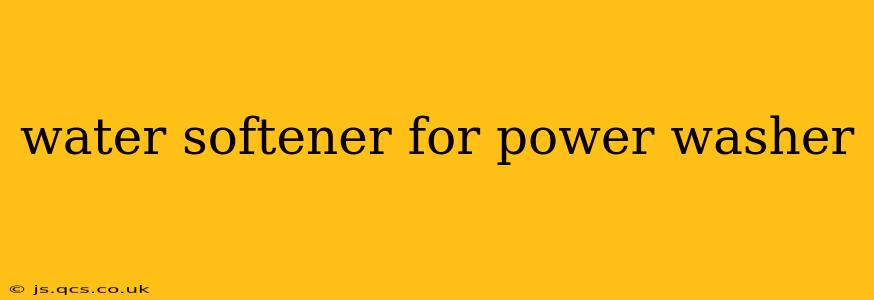Hard water can significantly impact the performance and longevity of your power washer. Mineral deposits clog nozzles, reduce pressure, and even damage internal components. A water softener for your power washer can be a game-changer, ensuring consistent cleaning power and extending the life of your equipment. This guide explores the benefits, different softening solutions, and considerations when choosing a system.
Why Use a Water Softener with a Power Washer?
Hard water contains high concentrations of minerals like calcium and magnesium. These minerals build up inside your power washer, causing several problems:
- Reduced Pressure: Mineral deposits restrict water flow, leading to significantly lower pressure and less effective cleaning.
- Clogged Nozzles: Nozzles become blocked, requiring frequent cleaning or replacement.
- Internal Damage: Scale buildup can damage internal components, leading to costly repairs or premature equipment failure.
- Spotting and Staining: Mineral deposits can leave unsightly spots and stains on surfaces after cleaning.
Using a water softener prevents these issues, leading to better cleaning results and a longer lifespan for your power washer.
What are the Different Types of Water Softeners for Power Washers?
Several options exist for softening water used in a power washer:
1. Whole-House Water Softener:
This is the most comprehensive solution. A whole-house system softens all the water entering your home, benefiting not just your power washer but also other appliances and fixtures. While the most expensive upfront, it offers long-term cost savings and improved water quality throughout your house.
2. Point-of-Use Water Softener:
This type of softener is installed directly on your power washer's water supply line. It's a more targeted approach, softening only the water used for power washing. This is a cost-effective solution if you only need softened water for your power washer and don't want to treat your entire home's water supply.
3. Water Filter with Softening Capabilities:
Some high-quality water filters incorporate softening capabilities. These filters are generally smaller and easier to install than dedicated softeners, making them a convenient option for some users. However, their softening capacity might be more limited compared to dedicated water softening systems.
How Much Does a Water Softener for a Power Washer Cost?
The cost varies widely depending on the type of system you choose:
- Whole-House Systems: These typically range from several hundred to over a thousand dollars, depending on the size and features.
- Point-of-Use Systems: These are generally more affordable, ranging from a few hundred dollars to several hundred.
- Water Filters with Softening: These tend to be the most budget-friendly, often costing less than $200.
What is the Best Water Softener for a Power Washer?
The "best" water softener depends on your specific needs and budget. Consider the following factors:
- Frequency of Power Washing: If you power wash frequently, a whole-house system might be worthwhile. If it's occasional use, a point-of-use or filter with softening might suffice.
- Water Hardness: The level of hardness in your water will determine the necessary capacity of the softener. A professional water test can help determine this.
- Budget: Balance the upfront cost with the long-term benefits and maintenance costs.
How to Install a Water Softener for a Power Washer?
Installation varies depending on the type of system. Whole-house systems require professional installation, while point-of-use systems can often be installed by a handy homeowner following the manufacturer's instructions. Always consult the manufacturer's instructions for detailed guidance.
Can I Use a Water Filter Instead of a Water Softener?
A water filter can remove some sediment and impurities, but it won't effectively remove the minerals that cause hard water problems. While a filter can improve water quality, it's not a replacement for a water softener if you need to address hard water issues.
What are the Maintenance Requirements for a Water Softener?
Regular maintenance is essential to keep your water softener functioning optimally. This typically involves regular salt refills (for salt-based softeners), periodic filter changes (for filters with softening capabilities), and occasional cleaning or flushing to remove accumulated minerals.
By addressing hard water issues with a suitable water softener, you'll improve the efficiency, extend the lifespan, and enhance the cleaning power of your pressure washer. Remember to choose the system that best fits your budget, water conditions, and usage frequency.
